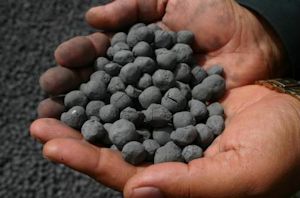Reprinted from the Carteret County News-Times
WILMINGTON — Directors of the N.C. State Ports Authority last week approved two planned projects for new commodities at the state port in Morehead City.
One deal gives the green light to a project that would export wood pellet from N.C. trees to European power companies. The export facility involves about $75 million in private investment in the eastern part of the state, a third of which will be at the port.
Supporter Spotlight
The other project involved about $1.14 million in state money for barge mooring areas to handle an iron product to be imported for Nucor’s steel mill in Hertford County.
The actions came during the board’s meeting in Wilmington.
The Council of State approved the wood pellet project at its meeting yesterday.
The wood pellet project involves building a single dome-shaped storage facility and related conveyor equipment with an option for construction of a second dome at a later time.
The deal expands the ports’ profile in the highly competitive wood pellet industry, the authority said in a statement.
Supporter Spotlight
 Tony Tata |
The private-public partnership keeps the state from incurring debt, N.C. Transportation Secretary Tony Tata told the News-Times after the meeting.
“No port capital is ever at risk,” Tata said. “It’s privately funded so there’s no exposure to debt liabilities.”
WoodFuels LLC, a San Diego, Calif., biofuels company, will finance and build a $25 million export facility at the port to receive, store and load wood pellets for export to Europe, where they will be used as a renewable energy source.
According to terms of the 20-year agreement, the facility will receive its first pellets for shipment in late 2014.
After the first year, revenue will range between $1.2 million and $2 million annually. On average, this deal could result in $840,000 annually in ports operating revenue that would be used to reinvest into the Morehead City port.
“That’s a pretty good add to the bottom line of the ports. And because there’s no debt exposure for the Ports Authority, that’s pure cash flow,” Tata said.
The project is also expected to support at least 150 direct and indirect jobs at the port and other North Carolina locations.
Two plants located close to the harvest areas in the eastern part of the state will produce the wood pellets. Tata said he expects creation of 65 direct jobs at each plant, 40 jobs in the logging industry and 40-55 jobs in the trucking industry and at the port.
Tata said the agreement is the third multi-million dollar deal the ports have closed in the last eight months and another example of state efforts to enhance the ports and ensure that North Carolina has the infrastructure in place to support growing industries that are critical to the state’s continued economic success.
“I’m proud of the teams here at the ports and at the Department of Transportation that are working hard to bring jobs and industry to Eastern North Carolina,” Tata said. “The governor has been involved in the decision making along the way and he has strongly supported bringing these industries to Carteret County and New Hanover and beyond so we can help revitalize parts of the economy that have been repressed for quite some time.”
The authority cited estimates by forest-industry experts at N.C. State University that U.S. production of wood pellets is expected to increase from 3 million tons four years ago, to nearly 10 million tons by 2015.
With its “vast amount” of renewable and sustainable wood fiber sources, North Carolina is an attractive location for wood biomass plants, according to the authority.
 Steve Troxler |
Earlier this year, the authority completed a deal with Enviva Holdings, a limited partnership, to construct and operate a similar facility at the N.C. Port of Wilmington. That facility is scheduled to open in early 2015.
“North Carolina is well-positioned to be part of an emerging biomass industry, and continued improvements at our state ports will help tremendously,” Agriculture Commissioner Steve Troxler said in a press release. “In addition, new opportunities such as this one will help revitalize our state’s forest products industry.”
The Morehead City facility will have capacity for about 300,000 metric tons of pellets, with about 400,000 tons per year expected to move through the port.
Mr. Tata said market demand is growing for wood pellets as biofuel and Drax Biomass, the sister company to Draz Power, a major electricity supplier in the U.K., has demand that cannot be met.
“The Enviva and WoodFuels deals are going to help them provide the supply for an increasing demand over in Europe,” Tata said.
The authority’s other action pertaining to the barge-fleeting facilities for the Nucor product, also on Thursday, was to award a $1.14 million construction contract to PreCon Marine Inc. of Chesapeake, Va.
The contract specifies replacement of existing anchoring devices just west of Radio Island and construction of moorings north of the Newport River high-rise bridge.
The authority earlier this year applied for state Coastal Area Management Act major development permit for the two docking facilities.
 Direct reduced iron, or DRI, is a semi-processed iron ore that looks like BBs. |
Also earlier this year, the authority approved a service agreement with Nucor Corp. to allow the company to ship direct reduced iron or DRI through the Morehead City port and the Intracoastal Waterway to the Nucor mill.
The product is to be transferred directly to barges from the ships on which it arrives.
DRI is a dry bulk product – semi-processed iron ore – that looks a lot like BBs for a pellet gun.
The product is a concern for neighboring property owners and the N.C. Coastal Federation, an environmental advocacy organization based near Newport.
Neal Littman, manager of the nearby Morehead City Yacht Basin, has expressed concerns about the DRI and its potential impact on his business and customers if handled at the port.
Mr. Littman said his research on the product showed it can be combustible, especially when exposed to moisture.
He said the city must have an emergency response plan in place.
“If we’re going to do that thing here we have to be prepared for the problems associated with it,” Littman said.
He said another concern with the project is the risk of barges blocking, even temporarily, the Calico Creek channel, which serves both the yacht basin and the nearby U.S. Army Reserve center.
Littman said he is also worried that the barges may create an “unsightly” mess at the entrance to the basin, which caters to upscale clients. He’s also concerned about other “noxious activities” that may be allowed at the port facility, part of which abuts the yacht basin property.
Dick Bierly, president of the Coastal Federation, said the organization believes DRI is a bad fit for the community.
“We really think there’s a flaw in that process,” Bierly said. “DRI is not totally benign.”
Port Authority spokesman Laura Blair has said DRI is safely and routinely handled at many U.S. ports,







